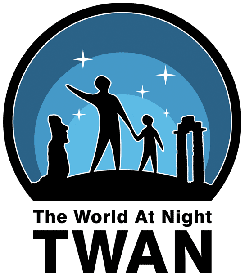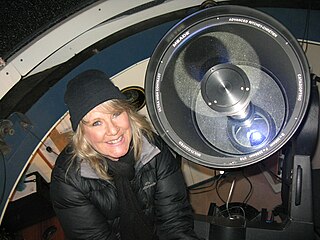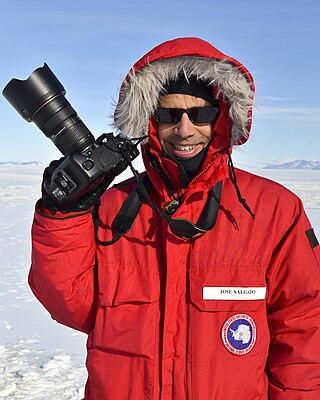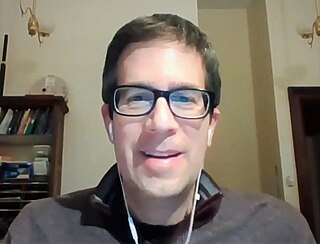
An astronomer is a scientist in the field of astronomy who focuses their studies on a specific question or field outside the scope of Earth. They observe astronomical objects such as stars, planets, moons, comets and galaxies – in either observational or theoretical astronomy. Examples of topics or fields astronomers study include planetary science, solar astronomy, the origin or evolution of stars, or the formation of galaxies. A related but distinct subject is physical cosmology, which studies the Universe as a whole.

The International Astronomical Union is a non-governmental organisation with the objective of advancing astronomy in all aspects, including promoting astronomical research, outreach, education, and development through global cooperation. It was founded in 1919 and is based in Paris, France.

The Royal Astronomical Society (RAS) is a learned society and charity that encourages and promotes the study of astronomy, solar-system science, geophysics and closely related branches of science. Its headquarters are in Burlington House, on Piccadilly in London. The society has over 4,000 members, known as fellows, most of whom are professional researchers or postgraduate students. Around a quarter of Fellows live outside the UK.

The Astronomical Society of the Pacific (ASP) is an American scientific and educational organization, founded in San Francisco on February 7, 1889, immediately following the solar eclipse of January 1, 1889. Its name derives from its origins on the Pacific Coast, but today it has members all over the country and the world. It has the legal status of a nonprofit organization.

The Perth Observatory is the name of two astronomical observatories located in Western Australia (WA). In 1896, the original observatory was founded in West Perth on Mount Eliza overlooking the city of Perth. Due to the city's expansion, the observatory moved to Bickley in 1965. The new Perth Observatory is sometimes referred to as Bickley Observatory.

International Dark Sky Week is held during the week of the new moon in April, when people worldwide may turn off their lights to observe the beauty of the night sky without light pollution. This event was founded in 2003 by high school student Jennifer Barlow of Midlothian, Virginia. It has been endorsed by the International Dark-Sky Association, the American Astronomical Society, the Astronomical League, and Sky & Telescope.

The International Year of Astronomy (IYA2009) was a year-long celebration of astronomy that took place in 2009 to coincide with the 400th anniversary of the first recorded astronomical observations with a telescope by Galileo Galilei and the publication of Johannes Kepler's Astronomia nova in the 17th century. The Year was declared by the 62nd General Assembly of the United Nations. A global scheme, laid out by the International Astronomical Union (IAU), was also endorsed by UNESCO, the UN body responsible for educational, scientific, and cultural matters.
Martin P. Mobberley is a British amateur astronomer, author, and former electronics engineer.

David John Eicher is an American editor, writer, and popularizer of astronomy and space. He has been editor-in-chief of Astronomy magazine since 2002. He is author, coauthor, or editor of 23 books on science and American history and is known for having founded a magazine on astronomical observing, Deep Sky Monthly, when he was a 15-year-old high school student.

Nicholas Szymanek, better known as Nik Szymanek, is a British amateur astronomer and prolific astrophotographer, based in Essex, England.

The StarPeace Project was a global special project first organised in conjunction with the International Year of Astronomy in 2009. StarPeace project participants held public star parties near a border of their country with a neighboring country. The intention was to show that there are no borders in the real Earth, borders are man-made and science has no borders.

Sufi Observing Competition is an international competition and like Messier marathon, but more difficult with various subjects.
Thomas Boles is a Scottish amateur astronomer, discoverer of astronomical objects, author, broadcaster and former communications and computer engineer, who observes from his private "Coddenham Observatory" in Coddenham, Suffolk, United Kingdom. He is known for having discovered a record number of supernovae. The main-belt asteroid 7648 Tomboles is named in his honor.

The World At Night (TWAN) is an international project to produce and present a collection of high-quality photos, videos, and virtual reality (VR) images of the night sky taken at various natural, cultural, and historic locations worldwide.

Babak Amin Tafreshi is an Iranian photographer, science journalist, and amateur astronomer. He is the creator and director of The World At Night (TWAN), an international program in which photographers from around the world capture images of night skies as seen above notable landmarks of the planet. He is also a member of the board of advisors of Astronomers Without Borders and a project coordinator for the International Year of Astronomy (IYA2009).

Jennie Margaret McCormick, FRASNZ is a New Zealand amateur astronomer and asteroid discoverer who conducts astronomical research from the Farm Cove Observatory in Auckland. She discovered the asteroid officially named New Zealand and has contributed to and been involved in a range of organisations and events to promote astronomy. McCormick has published in several journals and won awards for her contributions to astronomy.

José Francisco Salgado is an astronomer, experimental photographer, visual artist, and public speaker. He is known to use art to communicate science in engaging ways. Salgado's Science & Symphony films have been presented in more than 200 concerts and 150 lectures reaching a combined audience of more than 400,000 people in 18 countries. Orchestras that have presented his films include the Chicago Symphony Orchestra, Boston Pops Orchestra, the San Francisco Symphony, Czech National Symphony Orchestra, and Orchestra Teatro Regio Torino. Salgado is a member of the Bailey-Salgado Project, an audiovisual ensemble formed with composer and musician Tom Bailey. He is also a contributing writer for Digital Photography Review.
Universe Awareness or (UNAWE) is an international programme that aim to expose very young children in under-privileged environments to astronomy.
George Kildare Miley is an Irish-Dutch astronomer. He holds a professorship at Leiden University, where he served as director of Leiden Observatory from 1996 to 2003.

Dean Regas is an American astronomer, public speaker, author, and television host. He is most widely known as the cohost of the syndicated television show Star Gazers, which airs daily on more than 100 PBS stations around the world. He was the Outreach Astronomer for the Cincinnati Observatory from 2000 to 2023 where he specialized in astronomy education and public speaking. Regas is the author of three books Facts From Space!, 100 Things to See in the Night Sky, and 100 Things to See in the Southern Night Sky.
















